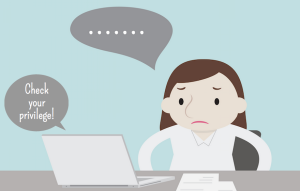
Credit: Getty Images
Originally published on Body Love Wellness and cross-posted here with their permission.
Of course, you know that you don’t actually need my permission to love your body, right?
Who the frick am I to give you permission to love your body?!
That’s your choice, isn’t it? No one has the right to give you permission or to take away permission.
So if I can’t give you permission, and no one else can give you permission, why then are you (possibly) still struggling to give yourself permission?
Perhaps I can think of a few reasons. But before I do, I want to make it clear that loving and accepting your body is actually really important, healing, and healthy.
You’re a spiritual being having a physical experience. The way that you experience the world is through your body. When you feel love and approval toward your body, then you can truly experience your life and the world around you.
The stress of worrying about whether your hair is right and whether your outfit disguises your belly rolls and whether you should’ve had that second cookie at that meeting at work all melts away.
You can live your life with more peace. You can hear your inner truth. You can enjoy being in a body that is uniquely yours.
And it truly doesn’t have the negative effects you think it will have.
You can do and experience all this and more, but first, you have to give yourself permission to love and accept your body.
In order to get that permission, you’ll probably need to work through at least one of these five objections, so let’s explore them a bit.
Reason #1: Everyone Around Me Hates His/Her Body, So People Won’t Like Me if I Like My Body
Most of us have a fear of being different – too different – than those around us.
For thousands of years, being an outcast could literally mean death, and so that desire to fit in with our social group is quite intense.
At the same time, we have to remember to think for ourselves, and make choices that are for our highest good.
If you’re drawn to body acceptance, there’s a reason for it.
And if you accept your body more and more, you may get some flack for it, and you may find that some people in your life don’t understand or respect it.
You may also, however, find that some of your friends want to learn more about it and go with you on that journey. You might find that you make new friends who are into body acceptance and are happy to encourage you.
And you may even become a voice for change for those around you.
Reason #2: Everyone Around Me Hates His/Her Body, So Why Do I Have the Right to Be Different
One of my favorite quotes of all time is this saying by Hillel the Elder: “If I am not for me, who will be for me?”
You have the right to be, do, and have anything that you want.
If you don’t stand for that right, who will?
You must be for yourself.
Acknowledge for yourself that you deserve to love your body.
Reason #3: I’ve Heard Negative Messages About My Body for Most of My Life, so They Must Be the Truth.
Negative messaging about our bodies is so insidious.
If you’re one of the lucky few who has managed to avoid hearing negative messaging at home and in school, then you’ve gotten it from the advertising you’ve been exposed to since birth.
It’s one of those flaws of human thinking patterns that we tend to believe what we hear if we hear it enough.
But just because you’ve heard something a lot does not mean it’s true.
And even if 99% of people believe it to be true, it doesn’t mean it is.
There is no objective truth that some bodies are beautiful and some are ugly. There is no objective truth that some bodies are good and some are bad.
Just knowing that your body is not horrible doesn’t mean that your inner critic is going to stop telling you that, but disentangling yourself from this belief is an important first step in accepting your body.
Reason #4: If I Start to Like My Body, I’ll Eat Junk Food All Day and Just Melt into My Couch Forever.
This is classic inner critic BS.
Here’s the thing: If you like your body, you’ll want to treat it well.
So, if you’re engaging in over-exercising and harming your body, you might find that loving your body forces you to reevaluate your exercise routine to make it more joyous and fun for your body, but it’s not going to mean never moving again.
Same goes for food.
When you start respecting your body, you’ll start to trust it when it says it’s hungry and when it says it’s full, and it’ll be easier to respect that information and act accordingly.
But I can assure you that you will not melt into the couch forever and ever.
Reason #5: I Don’t Know How to Love My Body
If this is your main reason for not loving your body, this is actually a step forward.
You know on some level that you want to accept and love your body, but don’t know how to do it.
So I want to encourage you to keep reading body positive blogs (including this one) and keep looking to connect with body positive people.
—
As I mentioned in my recent TEDx talk, just having the intention to love your body is a great place to start.
Think about what loving your body might look like for you.
How would it feel to love your body more? What might be different in your life?
Decide that you do love your body, and then practice acting from that place. It may be easier than you think.
Want to discuss this further? Login to our online forum and start a post! If you’re not already registered as a forum user, please register first here.
Golda Poretsky is a Contributing Writer for Everyday Feminism. She’s a certified holistic health counselor and founder of Body Love Wellness, a program designed for plus-sized women who are fed up with dieting and want support to stop obsessing about food and weight. Follow her on Twitter at @bodylovewellnes. Read her articles here and book her for speaking engagements here.
Search our 3000+ articles!
Read our articles about:
Our online racial justice training
Used by hundreds of universities, non-profits, and businesses.
Click to learn more




















